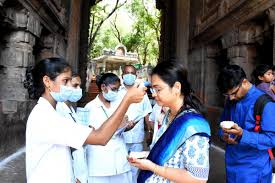 25-05-2020
25-05-2020
Covid-19 Claims Not Entirely Representative; Case For Greater Push For Senior Citizen Health Insurance

 Insurance Alertss
Insurance AlertssCovid-19 Claims Not Entirely Representative; Case For Greater Push For Senior Citizen Health Insurance
The Covid-19 health insurance claims figures released by the General Insurance Council (GIC) of India as on May 11 belie the figures for underreported cases that were treated in government and municipal hospitals. With health insurance premiums increasing dramatically after the removal of many exclusions like mental diseases, it is expected that this will also affect the ability of senior citizens to buy health insurance.
As per data released by GIC, claims received by insurance companies on May 11, 2020 were 1520, when the number of Covid-19 positive cases on an all-India basis were 67,152. This means that out of 1,000 cases, 22 cases were being handled by insurance companies under the policies. Nine hundred and seventy eight (978) cases were either being treated in government hospitals or a small percentage being treated in private hospitals was of out-of-own pocket expense cases.
If we see the claims paid by insurance companies (till May 11) then again, the figure is surprisingly low at Rs 12.47 crores (an average of Rs 1.35 lakh per patient). According to GIC, claims received by insurance companies were Rs 28.90 crore and out of this claim paid were Rs 12.47 crore. The remaining were in process. No figures were available that how much is the deduction while passing claims for Rs 12.47 crore. We are sure that this amount will be significant as costs associated with personal protective equipment (PPE) etc. are not being paid by insurance companies.
We in the Insurance Foundation of India (IFI) estimate that as on May 20, claims received would be Rs 46 crore. Maybe on the higher side this figure can be as high as Rs 70 crore as more and more policy holders are preferring to go to private hospitals. So, we can say that this figure will be anywhere between Rs 46 crore to Rs 70 crore. IFI projections show that claims paid which were Rs 12.47 crores on May 11 would have increased to Rs 19.89 crore on May 20. On the higher side this figure might have reached Rs 35 crore.
In a country where health insurance premium figure is Rs 50,000 crore per year, claims being logged due to Covid-19 at Rs 50 crores is negligible.
This raises the question---why is this amount so low. Our viewpoint is:
Indian customers have been buying very small amount as sum assured---say Rs 1 lakh or on the higher side Rs 3 Lakh. The reason for the same is that statistics for health insurance claims reveal that on all India basis only 7% of the insured persons lodge the claims for hospitalization (after fulfilling the main requirement of 24 hours hospitalization) and average claim has been Rs 22,000 only. Even on the higher side, this figure can be taken in the year 2020 at Rs 30,000.
Our estimate is that more than 90% of health insurance policy holders (whether individual, family or group policy holder) have sum assured of Rs 3 lakh or below. Leave aside some group policies which have no room capping limit; large number of group policies have daily room rent capping of 1% of sum assured for room and 2% of sum assured for ICU.
This means that someone having Rs 1 lakh cover can only go to a private hospital where room rent per day permitted is Rs 1,000. In Metros in super specialty hospitals room rent can be Rs 12000 per day to Rs 20000 per day. As this is not possible under the policy terms, therefore, the patient is expected to pay the difference (Rs 11,000 out of Rs 12000 on per day basis out of his own pocket. Other costs like doctor’s fee, consultant’s fee etc. are also proportionately to be borne by the insured). This has turned out to be the main reason that very few health insurance policy holders have gone in for treatment in private hospitals for Covid-19. For the benefit of insurance companies, a smaller number of claims have come to general insurance or standalone health insurance companies for being paid.
We find that many corporates buy group health insurance policy but in view of budgetary constraints they limit a lower sum assured for majority of junior employees and families (supporting staff, sales persons) being covered for as little as Rs 1 lakh or sometimes even Rs 50,000. They also accept room rent capping (1% of sum assured ) for meeting the funds constraint. Another issue which Insurance Foundation of India has noticed is that the trend towards increase in premium rates has started affecting the renewal of insurance policies especially by senior citizens.
Mr. P Gupta (name changed) age 74 years and his wife ( 67years ) residing in Thane were paying Rs 12,000 as premium under PNB (bank group policy) issued by New India. He got intimation that this policy has been discontinued therefore he should go in for suitable family policy. As expected he thought of buying insurance policy from New India.
The premium quoted in a product available to that age group turned out to be Rs 54,000 per year. Expecting a retired person depending on interest income from fixed deposit (which has been getting reduced quarter by quarter) and some loss in a leading foreign mutual fund (which stopped operations last month) the ultimate decision taken by Mr. Gupta was that he is destined to live without any health insurance policy. We estimate that there are thousands and thousands of senior citizens who have moved out of health insurance protection in 2020 at the time when the need is being realized or felt by them.
Our thinking shows that our government has to come out with bold steps in the direction of health care and health insurance. We know that larger the number of customers, better is the pricing. As a bold step, Senior Citizen’s health Insurance has to be made mandatory. Further, it should be stipulated that from 58 to 60 years a person will have the chance to join the scheme and for first 2 years 50% subsidy will be given by the government to attract an increasing number of customers. As 2-year periods will be available therefore a good percentage of persons will join. The fear of adverse selection will be removed . At present if someone aged 67 years is buying health insurance for the first time then fear is that now the person is foreseeing some hospitalization and is buying health insurance.
Thus, a large number of insured coming in a big way may result in good reduction in premium (may be by 55% over the present premium rates ). This will encourage setting up of more hospitals, medical colleges, dental colleges, nursing colleges, reduction in medical equipment cost as India may be needing 2,000 MRI machines or 18 lakh dialysis machines to be installed to fulfill the need of the masses. Make in India programme will be a good initiative for producing MRI, Dialysis equipment and a large range of bio medical equipment within the country. Covid-19 has given us a good thought process for self-reliance and we as a nation will use this as a great opportunity.
As people become familiar with the benefits of health insurance, they will also come out of this syndrome of Rs 1 lakh policy and move up to buying policy of Rs 10 lakh sum assured.
That will be the golden era for the Indian insurance industry with maybe 250 Insurance Companies offering health Insurance products at right price with superior service and features (covering OPD ) for the benefit of large population. We are aware that our senior citizens population is expected to touch the figure of 30 crores or say 45 crore in the coming decades . We have to start thinking now . India as a nation has a bright future---we need positive optimistic thinking and work for growth of Health Insurance .
Source: Business World
